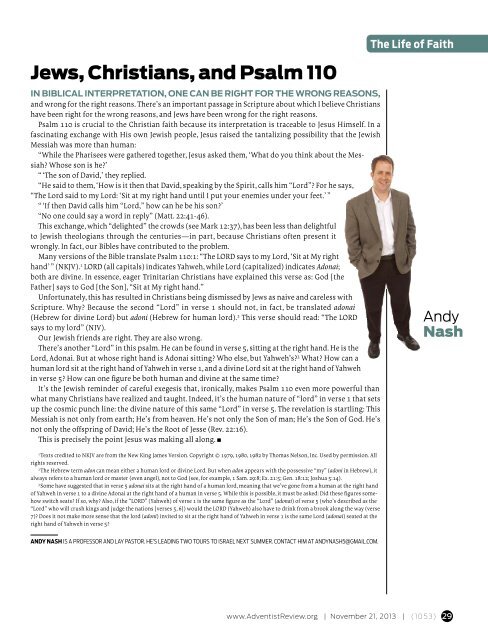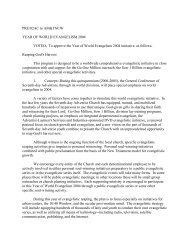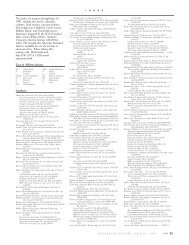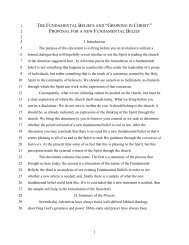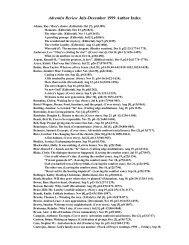Clicktivist to Activist
Download PDF - Adventist Review
Download PDF - Adventist Review
- No tags were found...
Create successful ePaper yourself
Turn your PDF publications into a flip-book with our unique Google optimized e-Paper software.
The Life of Faith<br />
Jews, Christians, and Psalm 110<br />
In biblical interpretation, one can be right for the wrong reasons,<br />
and wrong for the right reasons. There’s an important passage in Scripture about which I believe Christians<br />
have been right for the wrong reasons, and Jews have been wrong for the right reasons.<br />
Psalm 110 is crucial <strong>to</strong> the Christian faith because its interpretation is traceable <strong>to</strong> Jesus Himself. In a<br />
fascinating exchange with His own Jewish people, Jesus raised the tantalizing possibility that the Jewish<br />
Messiah was more than human:<br />
“While the Pharisees were gathered <strong>to</strong>gether, Jesus asked them, ‘What do you think about the Messiah?<br />
Whose son is he?’<br />
“ ‘The son of David,’ they replied.<br />
“He said <strong>to</strong> them, ‘How is it then that David, speaking by the Spirit, calls him “Lord”? For he says,<br />
“The Lord said <strong>to</strong> my Lord: ‘Sit at my right hand until I put your enemies under your feet.’ ”<br />
“ ‘If then David calls him “Lord,” how can he be his son?’<br />
“No one could say a word in reply” (Matt. 22:41-46).<br />
This exchange, which “delighted” the crowds (see Mark 12:37), has been less than delightful<br />
<strong>to</strong> Jewish theologians through the centuries—in part, because Christians often present it<br />
wrongly. In fact, our Bibles have contributed <strong>to</strong> the problem.<br />
Many versions of the Bible translate Psalm 110:1: “The LORD says <strong>to</strong> my Lord, ‘Sit at My right<br />
hand’ ” (NKJV). 1 LORD (all capitals) indicates Yahweh, while Lord (capitalized) indicates Adonai;<br />
both are divine. In essence, eager Trinitarian Christians have explained this verse as: God [the<br />
Father] says <strong>to</strong> God [the Son], “Sit at My right hand.”<br />
Unfortunately, this has resulted in Christians being dismissed by Jews as naive and careless with<br />
Scripture. Why? Because the second “Lord” in verse 1 should not, in fact, be translated adonai<br />
(Hebrew for divine Lord) but adoni (Hebrew for human lord). 2 This verse should read: “The LORD<br />
says <strong>to</strong> my lord” (NIV).<br />
Our Jewish friends are right. They are also wrong.<br />
There’s another “Lord” in this psalm. He can be found in verse 5, sitting at the right hand. He is the<br />
Lord, Adonai. But at whose right hand is Adonai sitting? Who else, but Yahweh’s? 3 What? How can a<br />
human lord sit at the right hand of Yahweh in verse 1, and a divine Lord sit at the right hand of Yahweh<br />
in verse 5? How can one figure be both human and divine at the same time?<br />
It’s the Jewish reminder of careful exegesis that, ironically, makes Psalm 110 even more powerful than<br />
what many Christians have realized and taught. Indeed, it’s the human nature of “lord” in verse 1 that sets<br />
up the cosmic punch line: the divine nature of this same “Lord” in verse 5. The revelation is startling: This<br />
Messiah is not only from earth; He’s from heaven. He’s not only the Son of man; He’s the Son of God. He’s<br />
not only the offspring of David; He’s the Root of Jesse (Rev. 22:16).<br />
This is precisely the point Jesus was making all along. n<br />
Andy<br />
Nash<br />
1<br />
Texts credited <strong>to</strong> NKJV are from the New King James Version. Copyright © 1979, 1980, 1982 by Thomas Nelson, Inc. Used by permission. All<br />
rights reserved.<br />
2<br />
The Hebrew term adon can mean either a human lord or divine Lord. But when adon appears with the possessive “my” (adoni in Hebrew), it<br />
always refers <strong>to</strong> a human lord or master (even angel), not <strong>to</strong> God (see, for example, 1 Sam. 29:8; Ex. 21:5; Gen. 18:12; Joshua 5:14).<br />
3<br />
Some have suggested that in verse 5 adonai sits at the right hand of a human lord, meaning that we’ve gone from a human at the right hand<br />
of Yahweh in verse 1 <strong>to</strong> a divine Adonai at the right hand of a human in verse 5. While this is possible, it must be asked: Did these figures somehow<br />
switch seats? If so, why? Also, if the “LORD” (Yahweh) of verse 1 is the same figure as the “Lord” (adonai) of verse 5 (who’s described as the<br />
“Lord” who will crush kings and judge the nations [verses 5, 6]) would the LORD (Yahweh) also have <strong>to</strong> drink from a brook along the way (verse<br />
7)? Does it not make more sense that the lord (adoni) invited <strong>to</strong> sit at the right hand of Yahweh in verse 1 is the same Lord (adonai) seated at the<br />
right hand of Yahweh in verse 5?<br />
Andy Nash is a professor and lay pas<strong>to</strong>r. He’s leading two <strong>to</strong>urs <strong>to</strong> Israel next summer. Contact him at andynash5@gmail.com.<br />
www.AdventistReview.org | November 21, 2013 | (1053) 29


